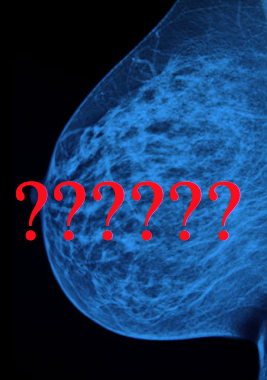
I read a fair amount of medical research, but a topic that always catches my attention is anything related to breast health, specifically preventing breast cancer. Pretty much the same information applies for resolving fibrocystic breast disease or other sources of breast discomfort.
Top of the pile today is a great article by Christie Aschwanden in Mother Jones, available online here, which is a great reminder that mammograms are not only lacking in any proven clinical value (finding breast cancer early doesn't really improve your chances: treatments have improved so later detection is not a death sentence) but possibly actually hazardous. In addition to the radiation (enough of which can give you breast cancer), which is a small and manageable risk for most people, there is the very real risk of harm incurred from unnecessary treatment.
Mammograms earned their stellar reputation because they found, and continue to find, many more abnormalities than can be felt on a physical exam. Those that are cancerous have well-established, and always improving, protocols for treatment. The problem is with the great majority of abnormal findings: they result in a biopsy diagnosis of ductal carcinoma in-situ (DCIS). DCIS is almost always, but not always, an innocuous finding. When DCIS is treated as a cancer, and a woman undergoes surgery, anesthesia, radiation and chemotherapy, it's not surprising that some very real risks to the rest of her health are the price she pays for reassurance about her DCIS. The best estimate is that only 15% of DCIS lumps would ever progress to be cancer that merits that kind of treatment; 85% are most likely benign.
The article has many stunning stories and facts, but I liked best the quote from Dr. Eric Topol, one of modern medicine's most respected analysts: "If mammography were a drug, the FDA would never approve it."
On to the second piece of news, this one out of MD Anderson Cancer Center, devoted to "making cancer history." A study published in the journal Cancer Research and summarized on MD A's site here, traces the connection between high sugar in the diet and greater risk for breast cancer, both primary and secondary. They specifically connected the frcutose (table sugar and high fructose corn syrup) with an increase in lung metastases, via an inflammatory route. (Other proposed mechanisms have involved promoting new blood vessels and stimulating epithelial growth factor through higher insulin levels.) Further study is warranted, and definitely yet one more reason to keep your sugar intake low. (It's hard to say what is low... I think US dietary guidelines let you have 5, 6, 7 teaspoons a day of sugar, which sounds like a lot to me. Hidden in cookies or ice cream, it's hard to count.)
Who are the women at greater risk for breast cancer? Lifestyle choices and realities that increase your risk for breast cancer include late childbearing, lack of breast feeding, poor sleep (short sleep or in a room not really dark) and shift work, alcohol consumption more than one drink a day, previous diagnosis of either breast cancer or melanoma, maternal family history of breast cancer, significant weight gain since puberty, and minimal exercise habits. If any of these is true for you (I can claim a couple), might be worth it to review the choices in your control going forward to reduce your risk of breast cancer.
